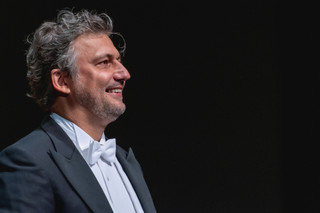|
Back
Kaufmann thrills Los Angeles Los Angeles
Santa Monica (The Broad Stage)
10/21/2021 -
Franz Liszt: Vergiftet sind meine Lieder – Im Rhein, im schönen Strome – Freudvoll und leidvoll II – Freudvoll und leidvoll – O Lieb – Es war ein König in Thule – Ihr Glocken von Marling – Die drei Zigeuner – Die Loreley
Robert Schumann: Widmung, Op. 25 No. 1
Franz Schubert: Wandrers Nachtlied, D. 768
Antonín Dvorák: Als die alte Mutter, Op. 55 No. 4
Johannes Brahms: Wiegenlied, Op. 49 No. 4
Carl Bohm: Still wie die Nacht, Op. 326 No. 27
Frédéric Chopin: In mir klingt ein Lied (arr. Alois Melichar)
Pyotr Ilyich Tchaikovsky: Nur wer die Sehnsucht kennt, Op. 6 No. 6
Richard Strauss: Zueignung, Op. 10 No. 1
Alexander von Zemlinsky: Selige Stunde, Op. 10 No. 2
Hugo Wolf: Verborgenheit
Gustav Mahler: Ich bin der Welt abhanden gekommen
Jonas Kaufmann (tenor), Helmut Deutsch (piano) 
J. Kaufmann (© Ben Gibbs Photography)
When “the greatest tenor” in the world swings through town, you take notice. When Jonas Kaufmann performs in a 500-seat venue in that town, you practically stampede toward the hall. The packed crowd at The Broad Stage in Santa Monica seemed to be in the know, squeezing shoulder-to-shoulder in the intimate venue. Don’t worry. Masks and proof of vaccination were required. The rapt audience were not disappointed.
Jonas Kaufmann, the affable singer, was charming and vocally generous singing for nearly 2 hours straight. It was a program with two halves: the first, songs of Franz Liszt; the second, an assortment of Lieder. All of the program was taken from Kaufmann’s excellent two quarantine albums. The two halves were separated by just a five minute pause. More of this, please. The tenor, an international star for a good 15 years, still has a youthful tenor, piercing and brilliant, thrilling and powerful. Although dealing most of the evening with a nagging frog in his throat, it was hard to tell the effects. It was a vocal tour-de-force and best displayed at the end of the night with the tenor providing a total of six encores, capped by Lehár’s Dein ist mein ganzes Herz, a signature tune that Kaufmann turned in with aplomb and thrilling vocalism.
Just prior, the printed program concluded with Mahler’s masterpiece, Ich bin der Welt abhanden gekommen. It was the most convincing performance of the evening: intense, abundant in vocal color and expressivity. Kaufmann inhabited Mahler’s song with an authenticity that drew in the audience. In his spoken introduction, Kaufmann kindly asked the audience to hold their applause until the end of each half. Now, given their opportunity, they did not seem to have the power to clap, entranced as they were. Kaufmann’s accompanist for the evening, the noble Helmut Deutsch, plied richness from his instrument, supporting Kaufmann, never overshadowing. His ability to sustain the Mahler at its slow tempo was impressive. One hardly missed the orchestration.
The Liszt were performed admirably, often thrillingly, but one can see why the songs are not as popular as they might otherwise be. Despite outstanding poets, virtuosic accompaniments, and ravishing harmonies, these songs require a significantly powerful operatic voice not necessarily always suited to Lieder. For the audience, they do not necessarily have as satisfying a melodic arc that Schubert, Schumann, and others are able to weave into their song. In fact, the most successful of the songs were those that were Schubert-like in this respect, such as a beautifully sung O liebe, so lang du lieben kannst. His Liszt encore, Es muss ein Wunderbares sein was likewise a pleasure.
Kaufmann’s crooning, as it’s been called, or simply off the chords style of singing was employed often. It worked many times but was occasionally distracting given the obvious effort it took, such as the high ending to the Liszt Die Loreley. Likewise on the Dvorák where the tenor’s effort was visible. Still, a singer of Kaufmann’s vocal power foraying mostly successfully into this repertoire with such a wide range of dynamic and expression is impressive. In the second half, Kaufmann appeared more at ease with the repertoire and his delivery, glancing down at the music stand in front of him less often and keeping the audience’s gaze more consistently, culminating in the Mahler performance.
“Why not just do what we love?” This was Kaufmann’s rhetorical question to the audience when describing his and Mr. Deutsch’s creative process for the “Selige Stunde” album. For two hours, Kaufmann and Deutsch did what they love and left the audience with the joy, spontaneity, and beauty of a thrilling recital.
Matthew Richard Martinez
|